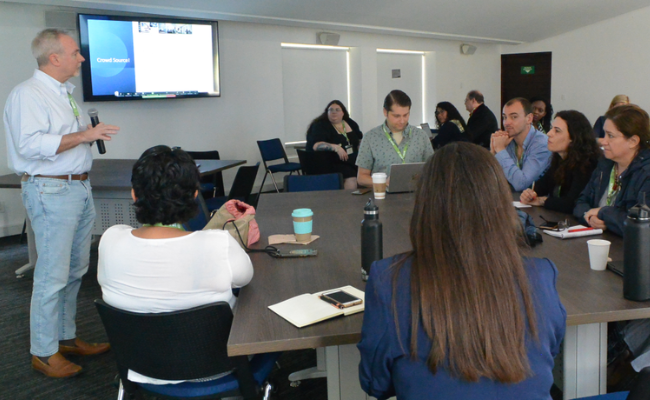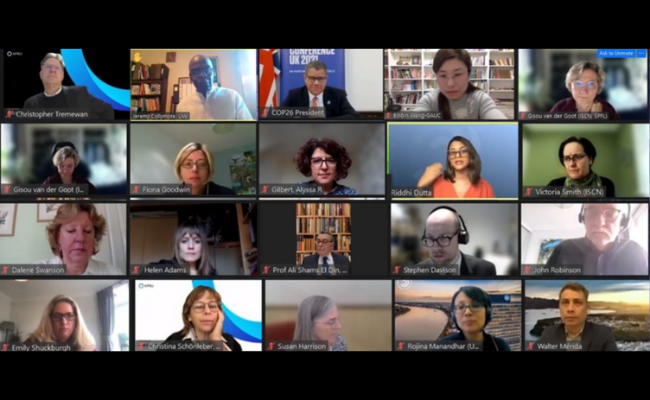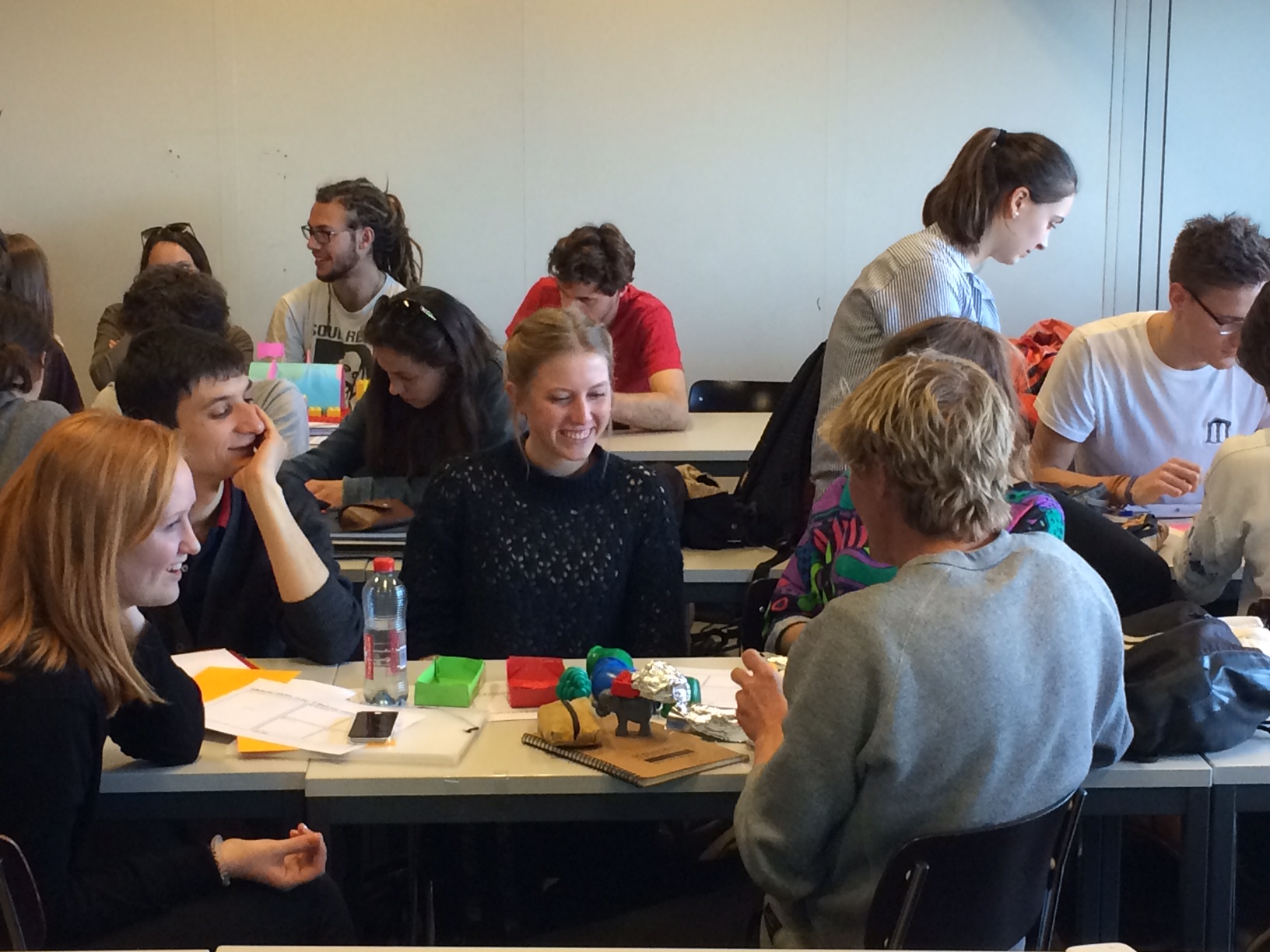Sustainability Reporting Survey Results Released
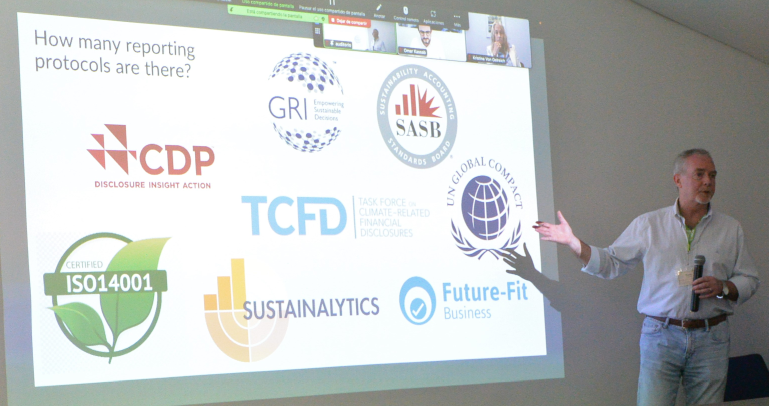
Across the globe, sustainability has become a strategic theme for higher education institutions. Not only in the traditional domains of research and teaching, but also in the institution’s mission and planning, public engagement, campus operations, and other related contexts. A key means for institutions to monitor and report their progress is sustainability reporting.
Based on this observation, the ISCN Sustainability Reporting Group developed a survey in late 2022 to gain an understanding of existing sustainability reporting practices in the global higher education sector. The survey also aimed to identify challenges and opportunities to improve current practices of sustainability reporting and form the basis for policy recommendations.
The survey covered a range of topics including the strategic priority of sustainability, reporting standards used, stakeholder influence, drivers, and many more. Sixty-nine valid responses were analysed.
Seven key insights were drawn from the survey responses.
- Sustainability is of strategic importance. Unsurprisingly given who was surveyed, sustainability is a strategic importance for respondents, particularly for ISCN members. University size or location does not impact strategic importance significantly. Almost all respondent universities define sustainability goals.
- Leadership counts. University leadership has the greatest influence on making sustainability a priority at an institution. Students, staff, and academics/faculty have a similar amount of influence. External entities like government, industry and society has some but lesser influence.
- Size and resources are related. The larger the university, the more likely there is a sustainability office.
- Reporting faces internally. Staff (academic and professional) and students are the priority target groups of sustainability reporting for respondents.
- Sustainability reporting is collaborative. More than 10 people are involved in the sustainability reporting process for universities across ISCN membership, location, and university size. A wide variety of units across the university are involved.
- Reporting is driven by commitment and better decision making. The two most important drivers for respondents were "Monitoring progress of sustainability performance to inform decision-making processes" and "Intrinsic belief in the importance of sustainability".
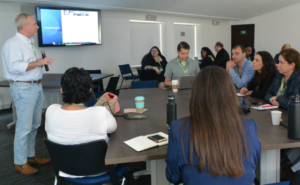
The Reporting Group then followed up with a workshop discussion at the 2023 ISCN Conference in Mexico City, where members discussed the preliminary results and agreed with the final conclusion:
7. There is no reporting standard.
Workshop members asked the Reporting Group to consider how ISCN might co-develop a general reporting standard that could become recognizable in the manner of corporate ESG reporting frameworks.
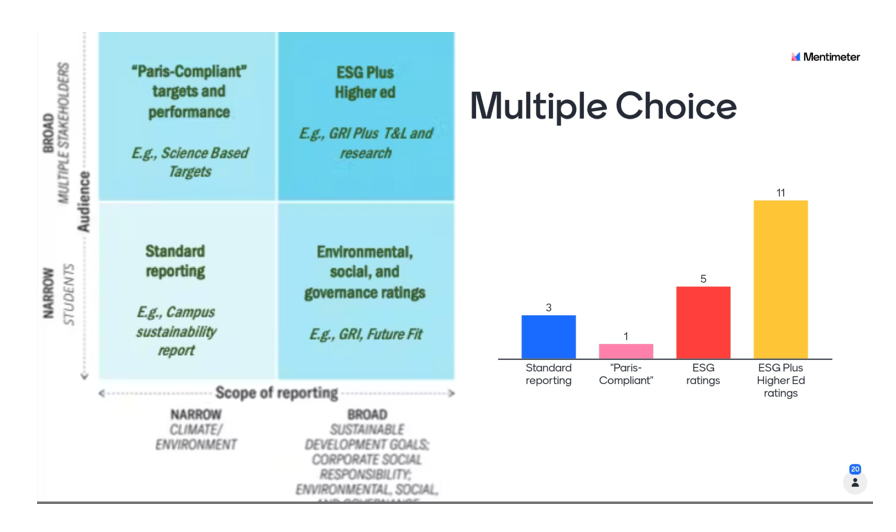
Download the ISCN Sustainability Reporting Survey Summary - April 2024 (PDF)
Many thanks to everyone that completed the survey, and current and former members of the sustainability reporting group for their work:
Ana Carla Madeira, Universidade do Porto (Portugal)
Andreas Dionyssiou, Cyprus University of Technology (Cyprus)
Angel Calderon, Royal Melbourne Institute of Technology (Australia)
Anna Berglund, formerly KTH Royal Institute of Technology (Sweden)
Claudia Zingerli Glatt, ETH Zurich (Switzerland)
Davis Bookhart, Northeastern University (USA)
Dimitrios Noukakis, EPFL (Switzerland)
Jen Crothers, ISCN
Kristina Von Oelreich, KTH Royal Institute of Technology (Sweden)
Omar Kassab, formerly ETH Zurich (Switzerland)
Paul Cross, ETH Zurich (Switzerland)
Sebastian Kahlert, ETH Zurich (Switzerland)
Sonja Moghaddari, EPFL (Switzerland)
Xime Trujillo, University of Pennsylvania (USA)
Please email [email protected] if you are interested in joining the group.
Edinburgh Earth Fellows
The Edinburgh Earth Fellows Program, an initiative of The University of Edinburgh, brings together students from across the academic spectrum to work on a range of climate and sustainability projects created in collaboration with university-wide academics and partners. This semester, Postgraduate Earth Fellows Christelle Kwizera and Sophie Zych-Watson will be working with ISCN to support strategic planning in membership development, funding, and sponsorship. Through this collaborative effort, The University of Edinburgh and ISCN are demonstrating their commitment to driving positive change and fostering the next generation of sustainability leaders. Our thanks go to Dave Gorman for funding and Matthew Lawson for organising these positions.
Christelle Kwizera

What are you studying/what is your research?
I am currently a Master of Science student, studying Climate Change Finance and Investment. I am planning to do a dissertation on the current scale and credibility of carbon credits from water projects in Sub-Saharan Africa.
Why did you want to become an Edinburgh Earth Fellow?
When I applied to The University of Edinburgh, I was excited about what the University was doing with sustainability and climate change. On arrival to campus, I realized there were many more initiatives than I initially thought. I wanted to be part of the vibrant community making it happen and the Fellowship offered a way to do this while delivering an actual project that would be useful. As I am only here for one year, the fellowship is a great way to building great connections with others in the field.
What do you hope to do with your career in this field?
I hope to get better at channeling climate finance to initiatives that need it, especially in Less Developed Countries (LDCs) and in currently under-funded adaptation sectors, such as water.
Given your work to date with ISCN, what has stood out to you about the network?
I have been amazed at the scale of commitment that ISCN members have when it comes to building sustainable operations in all they do. I keep getting wowed by the different initiatives and projects I get to learn about. The ISCN membership has clear value-aligned members, and I think it will be a great partner to new universities wishing to scale up their sustainability efforts.

Sophie Zych-Watson
What are you studying/what is your research?
I am currently studying for a Master’s degree in Outdoor Environmental and Sustainable Education. My emerging research focus is on place-based learning for marine sustainability among coastal communities in Scotland. I am also developing technical skills and working towards qualifying as a Mountaineering Leader. Following my degree, I hope to contribute to Scotland’s emerging green sector and address environmental issues through meaningful education initiatives that brings the outdoors into the classroom.
Why did you want to become an Edinburgh Earth Fellow?
I became an Edinburgh Earth Fellow as I wanted to direct my career focus towards working more closely with climate change adaption and sustainability. Thus far, my career has been focussed in the charitable sector, funding outdoor therapy and development for vulnerable individuals. Through working with the ISCN and the Edinburgh Earth Initiative, I am able to combine my existing funding experience with my current research towards actively working towards a more sustainable future in educational settings.
Working with ISCN through the Edinburgh Earth Initiative has also enabled me to engage with a range of academics and professionals across multiple disciplines. This has given me so many opportunities for shared learning and shared best practice, which has massively enhanced my personal development.
What do you hope to do with your career in this field?
Ultimately, I hope to combine my various professional and academic strands together in a meaningful way to contribute to active climate change mitigation both in Scotland and internationally. I would love to set up my own business working towards sustainable marine practices on the west coast of Scotland, but in the meantime, I hope to continue to engage with organisations, such as ISCN, who are directly engaged in promoting sustainability.
Given your work to date with ISCN, what has stood out to you about the network?
My current studies have emphasised the importance of a social justice approach to environmentalism, and an attentiveness to the different privileges or disadvantages that are faced when moving towards Net Zero and a sustainable future. ISCN’s initiative to leverage the international collective knowledge of member universities with localised issues on the ground in Latin America through the ISCN Latin American Chapter (ISCN-LATAM) particularly stands out in this regard. For me, a commitment to understanding the complex social and environmental challenges that exist in different contexts is important and critical if we are to generate impact in universities around the world.
New ISCN Peer Review Program
A critically important component of developing campus sustainability programs, strategic plans and policies is the engagement and feedback of the institution's core constituents. Less frequently, however, do universities actively seek feedback from other higher education institutions in the form of a peer review process. ISCN members have a wealth of experience and knowledge from which other members would greatly benefit.
We are excited to announce that we are launching a new ISCN Peer Review Program for members. This program connects members who are developing sustainability strategic plans, policies, and programs with other ISCN colleagues for review and feedback. The aim is to improve the final product delivered, as well as add further credibility to the process of how the document was developed.
Please email us at [email protected] if you would like to participate in the program or volunteer to be a reviewer.
Press Release: Research and university communities united to tackle global climate challenges
JOINT PRESS RELEASE
Brussels, 3 November 2022
Ahead of COP27, research and university organisations join forces to renew the call for collective, common global efforts for climate action, launched last year.
The European association of leading universities of science and technology (CESAER), the European University Association (EUA), the International Sustainable Campus Network (ISCN), Science Europe, the Network of Universities in Capitals (UNICA), the University of Strathclyde in Glasgow the city hosting COP26, gathered to mobilise their expertise and call for cooperation in urgent climate actions.
Today’s online symposium on “Interdisciplinarity for the Net-Zero Transition”, a lead-up event to COP27, was an opportunity for the six organisations to present their commitment for climate action, share good practice, concrete examples, and call for the mobilisation of research and higher education communities. In 2021, CESAER, ISCN, Science Europe and the University of Strathclyde, in the city of Glasgow which hosted COP26, launched a Call to Action for research performing and funding organisations and universities regarding the Net-Zero Transition. This year, EUA and UNICA joined the four partners in co-organising the COP27 lead-up symposium focused on “interdisciplinarity”.
Universities and research performing and funding organisations are key contributors to the global Net-Zero Transition effort in reducing their energy consumption and, most importantly, providing new insights into challenges, as well as solutions, including ‘green’ technologies and societal innovations. The climate crisis has multiple causes but only collective efforts and action, embedding whole-systems approaches will address and mitigate it effectively. Innovative and scientifically rigorous methods for estimating and mitigating increases in greenhouse gas and harmful emissions are needed to enable a more effective, robust and concentrated effort with resources being enabled for long-term investments to expedite the Net-Zero Transition.
“With our commitment for the Net-Zero Transition, together with partners from the research and university systems, we want to mobilise policymakers and societal stakeholders in a collective effort for the most pressing challenge of our time: climate change,” declared Professor Rik Van de Walle, President of CESAER.
“European universities are committed to responding to societal concerns about the climate crisis, including by tailoring our educational offerings to ensure maximum impact through our graduates. The efforts and reforms we are seeing on the part of universities are informed by the demands of our students and engagement with our local communities, two drivers that are just as meaningful for climate action as regulations or targets for specific industries” declared Michael Murphy, President of EUA.
“The Net-Zero Transition is needed now, more than ever. The energy crisis, the war in Ukraine, and the lingering effects of COVID are all striking and dramatic revelations of the interconnectedness of our world, of which climate and sustainability are the ultimate examples. We are therefore committed to promoting international collaboration and working to build bridges between our institutions, to deepen our impact and accelerate our efforts toward realizing the Net-Zero Transition,” stated Professor Gisou van der Goot, President of ISCN.
“Interdisciplinary research is not a new concept: we know we need to further mobilise all disciplines and organisations to tackle the climate crisis. We have just published a report with the experiences of Science Europe members. We need to scale up these efforts and work together involving all disciplines, research partners and societal stakeholders,” stated Angelika Kalt, Vice-President of Science Europe.
“UNICA universities have the unique privilege of being in capital cities, which gives them the ability and the responsibility to influence European and government policies on the crucial challenges affecting our societies and our planet. We are determined to build on this specificity by encouraging our members to harness their academic research, innovative grit, and heterogeneous communities to impact policies in the direction of a green transition. We are committed to reach a sustainable future,” said Professor Luciano Saso, President of UNICA.
“We share a vision of a world where research and education communities work together to solve urgent global challenges and believe that research and education will underpin a sustainable relationship between the use and preservation of natural resources, and human activity,” said Professor Sir Jim McDonald, Principal and Vice-Chancellor of the University of Strathclyde in Glasgow (UK).
The organisers propose a systemic approach where universities, national research performing organisations and research funding organisations shall work together, involving policymakers, business sectors, and non-government organisations, in Europe and globally.
-------
Further information
Call To Action to Research Organisations for the Net-Zero Transition (pdf)
Press contact
Valentina Garoia, Science Europe Communications Manager
Email: [email protected]
Tel.: + 32 (0)2 226 03 06
Organisers
CESAER is the European association of leading specialised and comprehensive universities of science and technology that: champion excellence in higher education, training, research, and innovation; influence debate; contribute to the realisation of open knowledge societies; and deliver significant scientific, social, economic, and societal impact.
European University Association (EUA) represents more than 850 universities and national rectors’ conferences in 49 European countries. EUA plays a crucial role in the Bologna Process and in influencing EU policies on higher education, research, and innovation. Through continuous interaction with a range of other European and international organisations, EUA ensures that the independent voice of European universities is heard.
International Sustainable Campus Network (ISCN) is a global network of 100 universities in over 30 countries. The mission of the network is to provide an international forum to support higher education institutions in the exchange of information, ideas, and best practices for achieving sustainable campus operations and integrating sustainability in research and teaching.
Science Europe is the association representing 40 public research funding and performing organisations across 30 European countries. It brings together the scientific expertise of its members to push the frontiers of how scientific research is produced and delivers benefits to society. It advocates science and the scientific community to help build the European Research Area.
UNICA is an institutional Network of Universities from the Capitals of Europe. It is currently made up of 56 universities from 41 capital cities of Europe. UNICA seeks to facilitate international collaborations and promote academic leadership through understanding and sharing between its Members throughout the European Higher Education Area. UNICA articulates the views of Member Universities to European institutions, to national, regional, and municipal governments, and internationally.
University of Strathclyde is a leading international technological university based in Glasgow, UK. Inspired by the founding principle ‘a place of useful learning’, its mission is to make a positive difference to the lives of its students, to society and to the world. It is a member of CESAER and ISCN and works closely with government, industry and NGO partners on the Net-Zero Transition.
TASK by Sulitest
We are partnering with Sulitest in #ChangingEducation
TASK™ – The Assessment of Sustainability Knowledge – is a radical new online certificate! By taking TASK, you
🎓 incite universities to accelerate education for sustainability
💼 show recruiters sustainability is important for you
🚀 raise the bar of sustainability knowledge worldwide
To make TASK a success, Sulitest needs volunteers to join the TASK Pilot during October 31 - November 18, 2022
Sign up here: bit.ly/task-pilot
By joining the pilot, you will
🎉 Receive a voucher in Spring 2023 to complete the official TASK™ certificate once launched
🙌 Be recognised with a TASK™ Pilot Study Participation Recognition that can be used to communicate your key role in developing this international
standard
📚Prepare for the official TASK™ since the pilot will have the same shape as the future assessment
#TASKbySulitest #ChangingEducation #ChangeEducation
Transformational Change and 3rd-Way People
Guest post written by Wendy M. Purcell, PhD FRSA, Harvard T.H. Chan School of Public Health
The ISCN Conference 2022 opened with the session ‘Sustainability: A Manifesto for Change and ‘Third-way’ People’ that brought together authors from the forthcoming Bloomsbury Handbook of Sustainability in Higher Education (Editors: Wendy M. Purcell & Janet Haddock-Fraser; due out early 2023). Julie Newman (Massachusetts Institute of Technology, USA) and Shana Weber (Princeton University, USA), authors of Chapter 13 ‘Accelerating Response to a Changing Climate: Solutions Across Scales’, Julio Lumbreras (Universidad Politécnica de Madrid, Spain) author of Chapter 15 ‘University-City Partnerships for Sustainable Urban Transformations’ (co-authored with Jaime Moreno-Serna, Guillermo Palau, Jordi Peris, Valentia Oquendo, Teresa Sánchez-Chaparro, and Carlos Mataix), and Dave Gorman (The University of Edinburgh, UK), author of Chapter 16 ‘Transformational Change: Lessons from the University of Edinburgh (co-authored with Michelle Brown) and I (author of Chapter 14 ‘University Leadership and Governance Enabling Sustainability and the SDGs’) each shared highlights from our chapters. The book concludes with a ten-point manifesto for change in higher education fueled by sustainability and engagement with the SDGs.
The session then launched a dialogue with attendees around the topic of ‘third-way’ people, i.e., those able to traverse the academic and professional domains of a university or college to advance pan-institutional sustainability projects. It is worth noting that Julie, Shana, and Dave are each based in a university ‘green office’, while Julio works closely as a member of a cross-university interdisciplinary institute charged with addressing the SDGs. They each shared examples of ‘boundary spanning’ projects, revealing how they navigated the inherent tensions of discipline-based scholarly communities, professional domain groupings, and student subject communities. In this way they are able to advance sustainability projects that are multi-faceted, unbounded, and emergent.
As the work of sustainability in higher education extends beyond a focus on energy and estates into institutional strategy and academic mission, so too then university green offices are assuming new responsibilities. They are working horizontally across functions of the institution, vertically within the hierarchy of institutional leaders and subject leaders, engaging with stakeholder groups internally and externally, and extending their reach locally and globally. They are networked leaders, collaborating across these different boundaries to advance sustainability. To address the complexities inherent in the pursuit of sustainability within higher education and through the academy into society at large, demands leaders able to connect people to practice, translate strategy to action, and create value through delivery of the mission and brand.
The ISCN wants to keep this conversation going, and is furthering the webinar series featuring authors from the Bloomsbury Handbook of Sustainability in Higher Education.
Webinar 2: https://international-sustainable-campus-network.org/student-leadership-community-entrepreneurship-for-sustainability/
Webinar 3: https://international-sustainable-campus-network.org/advancing-sustainability-in-fragile-contexts/
Fourth webinar details to come
Photo by Possessed Photography on Unsplash
Global climate summit launches worldwide education coalition
ISCN is proud to be a partner in a newly formed worldwide education coalition in support of the Right Here, Right Now Global Climate Summit.
The December 1–4 summit is co-hosted by United Nations Human Rights and the University of Colorado Boulder and will take place virtually and in person on the university’s campus in Boulder.
Learners and educators of all ages, from primary school classrooms to university research labs, are invited to engage in this landmark event through the new Right Here, Right Now Education Coalition. Participating institutions and individuals will receive free access to a coalition toolkit—including information on how to host watch parties and how to spread the word about the connections between human rights and climate change, and why that connection matters to everyone.
“Climate change is already having significant impacts around the world, and marginalized communities often bear the brunt of the devastating impacts of these events. Through the new Right Here, Right Now Education Coalition, we aim to galvanize people around the world to focus on addressing the urgent issue of climate change through a human rights lens.”
—Heidi VanGenderen, CU Boulder chief sustainability officer, co-chair of the summit’s steering committee
Beyond ISCN, Right Here, Right Now Education Coalition partners include the Association of American Universities (AAU), American Council on Education (ACE), Association for the Advancement of Sustainability in Higher Education (AASHE), Association of Public & Land Grant Universities, Global Council for Science and the Environment, Second Nature and the University Climate Change Coalition (UC3). Through this coalition, the summit is already connecting with thousands of educational institutions and related entities around the world.
Departments, classes, clubs and people affiliated with educational institutions are encouraged to join the summit by watching events locally from their computers and phones—either live or through recordings.
Summit organizers are developing climate education and summit-specific resources for educators and will share them with coalition members as they become available.
“The summit organizers want to thank our amazing partners,” said Heidi VanGenderen, CU Boulder’s first chief sustainability officer and co-chair of the summit’s steering committee. “To solve the world’s climate crisis, young people from all nations need the chance to learn about how climate change is affecting their own communities. These organizations are helping to share those opportunities with the next generation of global leaders.”
The summit will bring together thought leaders, youth activists, and scientific, political, educational, cultural and industry experts from around the world for keynote addresses and panels exploring how climate change impacts fundamental rights, including the right to food, safe water, housing and health.
The event will include three keynote speakers, including former president of Ireland and climate justice advocate Mary Robinson, Indigenous rights advocate Sheila Watt-Cloutier and human rights advocate Kumi Naidoo, in addition to more than 30 other panelists and speakers from Colombia, Cameroon, Trinidad and beyond.
Learn more about and join this global network of students and educations
Sustainability Reporting Survey – Invitation to participate
Deadline extended to December 14, 2022.
You are invited and encouraged to participate in a survey on Sustainability Reporting at Higher Education Institutions. The survey will gain an understanding of existing sustainability reporting practices in the global higher education sector.
Your response is valuable and will help us to identify current practices for reporting sustainability, the associated opportunities and challenges, and will form the basis for policy recommendations.
The survey was created by experts from an international group of higher education institutions with the support of ISCN.
The deadline for completion is October 31, 2022 December 14, 2022 and the survey will take around 45 minutes to complete. It is possible to complete the survey in multiple sessions if the same browser is used.
Your participation is greatly appreciated in compiling a comprehensive picture of sustainability around the world. Anonymised results will be shared in a report in 2023.
Contact [email protected] if you have any questions about the survey.
Photo by Jason Goodman on Unsplash
COP26 President convenes higher education sustainability and climate network leaders
On February 21, 2022, COP26 President Alok Sharma, in partnership with the UK COP26 Universities Network and the International Sustainable Campus Network, brought together leading global climate and sustainability networks to explore opportunities for collective impact in the run-up to COP27.
President Alok Sharma focused on the critical role that universities play in advancing climate action and emphasised that universities need to work together in order to maximise their climate impact. The session called on higher education institutions to unite under a collective vision to drive the Glasgow commitments forward and keep momentum going toward COP27.
ISCN Board President, Gisou van der Goot and ISCN Executive Director, Victoria Smith attended the meeting and will continue working with global network colleagues to plan for a coordinated presence at COP27.
Fund your project with an ISCN Grant!
We recognize that this is an exceptional time for all across the globe, and we hope you and your families are staying healthy and well.
As we think of ways of building resilience into our work in sustainability on our campuses, continued collaboration with ISCN members remains a top priority. With this in mind, we are pleased to announce the second round of ISCN Capacity Building Seed Funding for 2020.
These grants are designed to help ISCN members leverage the network and propel emerging projects forward. Given that much of our work is now virtual, we are keen to see projects with innovative engagement solutions for the near-term.
We are offering seed funding of up to $5,000 (USD) per project. To leverage the pool of funding for members most effectively, projects that can contribute match funding will receive a higher score (note - this is not a requirement to submit a proposal).
We are looking to fund projects across these three categories:
- Ambassadors - a mentoring program for members and pilot institutions
- Peer Exchange - a process for members to engage with other member schools
- City-University - an opportunity for members to work with city partners to pilot joint initiatives
We are also open to new project streams, so please do share your ideas with us. Complete a letter of interest and identify your project partners, goals and budget by September 18th, 2020.
To download the ISCN Capacity Building Seed Funding Submission Template please click on this link: [download id="4686"]
Please fill out the project template and send to:
Victoria Smith,
Co-Executive Director, ISCN
Warmly,
The ISCN Leadership Team
